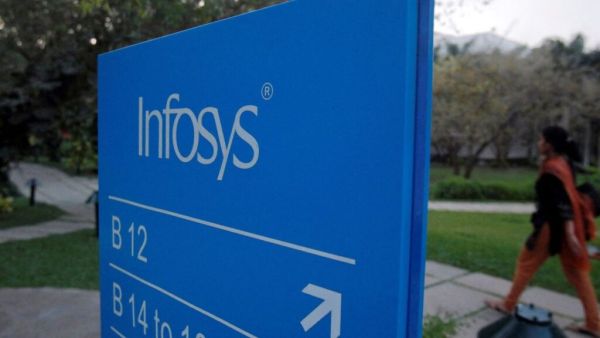
Indian IT stocks fell sharply on Monday morning, with sector heavyweights TCS, Infosys, and Tech Mahindra leading the decline after the Trump administration’s unprecedented $100,000 H-1B visa fee hike sent shockwaves through the $245 billion industry.
The Nifty IT index dropped over 3 per cent in early trade, wiping out ₹63,000 crore in market value from the top 10 IT companies. The BSE Sensex shed 475.16 points to 82,151.07 while the 50-share NSE Nifty slumped 88.95 points to 25,238.10.
TCS shares tumbled to a low of ₹3,063 before recovering slightly to ₹3,104, down 2.07 per cent by 10 am.
Infosys dropped 1.88 per cent to ₹1,511, hitting an intraday low of ₹1,480, while Wipro declined 2.13 per cent and Tech Mahindra fell the most at 6 per cent.
HCL Technologies, LTIMindtree, and other mid-tier players also faced selling pressure as investors grappled with the implications of the massive fee increase.
US President Trump’s proclamation, effective September 21, imposes a one-time $100,000 fee on new H-1B visa applications—a staggering jump from the current $1,500-$4,000 range.
The White House later clarified that the fee applies only to fresh petitions and not renewals or existing visa holders, providing some relief to panic-stricken professionals.
The move fundamentally alters the economics of deploying Indian talent in the US market, which generates over 60 per cent of revenues for most Indian IT firms.
“Cost arbitrage between sending an Indian employee versus hiring locally in the US will reduce substantially, and companies need to rework hiring and pricing strategies,” said Sunny Agrawal, Head of Fundamental Research at SBI Securities, told ET.
Data from the US Citizenship and Immigration Services reveals the scale of potential impact.
TCS topped Indian companies with 5,505 H-1B approvals in fiscal 2025, followed by Infosys (2,004), LTIMindtree (1,844), HCL America (1,728), and Wipro (1,523).
Amazon led all companies with 10,044 H-1B workers, highlighting how the fee hike affects both Indian and US tech giants.
Industry leaders, NASSCOM respond
NASSCOM, India’s IT industry body, welcomed the White House clarification while acknowledging the challenges ahead. “The clarification makes clear that the measure will not affect current visa holders and will apply as a one-time fee only to fresh petitions. This has helped address the immediate ambiguity surrounding eligibility and timelines,” NASSCOM stated.
The organisation emphasised that Indian companies have already reduced H-1B dependency, with approved visas dropping from 14,792 in 2015 to 10,162 in 2024.
“H-1B workers for the top 10 Indian and India-centric companies are less than 1 per cent of their entire employee base,” NASSCOM noted, projecting only “marginal impact” for the sector.
Former Infosys CFO Mohandas Pai dismissed claims of cheap labour exploitation, pointing out that the average salary paid by the top 20 H-1B employers exceeds $100,000.
He predicted the fee hike would “dampen fresh applications by companies and may accelerate offshoring”, while encouraging companies to expand India-based Global Capability Centres.
The visa fee hike threatens to slow India’s IT services export growth below 4 per cent, Emkay Global’s Chief Economist Madhavi Arora told ET.
“Near-term impact may be limited on IT revenue/margins. However, if sustained, it could disturb Indian IT exports, companies’ traditional models, pressurise project margins, disrupt Indian IT supply chains and on-site projects,” she warned.
The timing compounds existing challenges for IT stocks, which have underperformed significantly in 2025. TCS has declined 23 per cent year-to-date, Infosys has dropped 18 per cent, and Wipro has lost 15 per cent amid weak global demand and cautious earnings commentary.
Several mid-tier companies, including Coforge, Persistent Systems, and Mphasis, have already informed exchanges that the visa fee hike will have “no material impact,” citing reduced reliance on H-1B visas and increased local hiring. However, analysts warn that smaller firms that are more dependent on fresh visa approvals could face sharper margin pressures.
Strategic shift
The visa policy change may accelerate Indian IT companies’ ongoing transformation toward local hiring and offshore delivery models. Kunal Bahl, co-founder of Snapdeal, told HT that he anticipates “reverse migration” with “a tremendous number of talented individuals headed back to India,” potentially boosting the country’s talent density.
Industry experts suggest the move could drive more work toward India-based Global Capability Centres while forcing companies to justify visa costs only for critical, irreplaceable roles. As Commerce Secretary Howard Lutnick bluntly stated, companies must decide whether each worker is “valuable enough to have $100,000 payment to the government, or they should head home and hire an American”.
-
PM Modi’s 24-Year Legacy: The Vision Bharat AI Filmmaking Challenge Is Open, Are You Ready?

-
Vivo v60e launched in India: 200MP camera, 90W fast charging and powerful battery; Deets inseide

-
Who is Ragini Das? Google rejected 12 years ago, now the head of Google India startups became

-
India to Host Global Research Symposium on Ai and Its Impact in Feb 2026 | Technology news

-
Did Dhoni leave CSK? Mi’s jersey appears, fans were shocked; Know what is the truth
